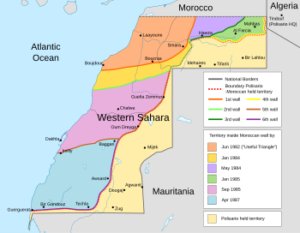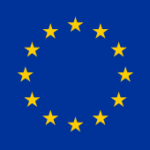At Western Sahara: Visiting A Forgotten People

Western Sahara – Map: en.wikipedia.org
06-17-2024 ~ South of the Algerian town of Tindouf on the border with Western Sahara are five refugee camps. The camps are home to the Sahrawi people of Western Sahara and are administered by their freedom movement Polisario, which is fighting to liberate their homeland from Morocco.
Life in the desert camps leaves a deep impression and testifies to a people who, despite limitations, have managed to build a well-organized society under harsh conditions. “We Sahrawis were originally a nomadic people who used to travel around on camels and settled in different places in and around Western Sahara. There were no borders that limited us from moving into what is today Mauritania or Algeria,” said Jadiya who is a translator.
The colonial era saw European powers come to Africa to take over territories, exploit labor, and extract natural resources. In Western Sahara, the Portuguese and French were first beaten back by the local population before Spain managed to colonize the area in 1884. In 1973, the Polisario freedom movement was established by the indigenous Sahrawi people to liberate their land from the Spanish empire.
Western Sahara remained a Spanish colony until 1975 when the Moroccan government organized a so-called “Green March” with 350,000 protesters marching into Western Sahara to claim the land. The protesters pressured Spain to leave Western Sahara, which Morocco then occupied. Today, Western Sahara is still occupied by Morocco and is thus considered to be Africa’s last colony.
Desert Camps
It is around 35 to 40 degrees Celsius in Wilayah of Bojador, the smallest of the five refugee camps on the border with Western Sahara. My feet are boiling in my shoes, but walking in bare feet is not an option. The sand is far too hot. According to Filipe, a local Sahrawi engineer educated in the Soviet Union, it has been five to six years since it last rained in the camps. “Not a single drop from the sky,” he says. Read more
Rebuilding The Left Is Crucial To Stemming The Surge Of Europe’s Far Right

C.J. Polychroniou
06-12-2024 ~ Rebuilding the Left Is Crucial to Stemming the Surge of Europe’s Far Right.
Just over half of the 373 million citizens eligible to vote across the 27 European Union (EU) countries bothered to cast a ballot during the four-day European Parliament (EP) election that concluded on June 9. Germany — the EU’s most populous country, and its political and economic powerhouse but with its days as an industrial superpower rapidly coming to an end — saw a record-high voter turnout, with close to 65 percent of eligible voters turning out for the EP elections. Apparently, German citizens may have felt that the “business as usual” approach both in Brussels and inside their own country could no longer go on, which is why they dealt a humiliating defeat to the coalition government of Chancellor Olaf Scholtz. His ruling party, the Social Democrats, recorded their worst-ever result in EP elections, obtaining less than 14 percent of the vote. The conservatives — whose policies on immigration and climate have shifted close to the position of the far right on these issues — came in first, with over 30 percent of the vote, while the far right Alternative for Germany (AfD) came second by pulling 16.5 percent of the vote, up from 11 percent in 2019. The Green Party’s vote dropped by 8.5 percentage points, from 20.5 percent to 12 percent.
Undoubtedly, in Germany’s political and cultural environment today, anti-immigrant and anti-climate policies, and overall support for hardcore conservative and far right outlooks won.
By contrast, Greece, one of the EU’s peripheral countries, saw an explosive and unprecedented (by Greek standards) abstention rate, estimated to be around 60 percent. The ruling conservative party of New Democracy won the elections with 28.31 percent of the vote, taking seven seats, but suffered heavy losses (more than 1 million votes) from the last general elections. The once-radical Syriza party came second with 14.92 percent and four seats, while the social democratic PASOK came third with 12.79 percent and three seats. Greek Solution — an ultra-nationalist far right party which was created in the aftermath of Golden Dawn’s demise following its conviction for operating a criminal enterprise — came fourth with 9.3 percent and two seats, while another far right party, Niki, won 4.37 percent and one seat. The Communist Party received 9.25 percent of the vote and two seats. Read more
Roman Oligarchs Avoided Tax Liability And Restrictions On Land Size

Ager publicus – Ills.: de.wikipedia.org
06-10-2024 ~ The oligarchic tradition of land-grabbing and tax dodging goes back centuries.
Roman land tenure was based increasingly on the appropriation of conquered territory, which was declared public land, the ager publicus populi. The normal practice was to settle war veterans on it, but the wealthiest and most aggressive families grabbed such land for themselves in violation of early law.
Cassius’ Indecent Proposal
The die was cast in 486 BC. After Rome defeated the neighboring Hernici, a Latin tribe, and took two-thirds of their land, the consul Spurius Cassius proposed Rome’s first agrarian law. It called for giving half the conquered territory back to the Latins and half to needy Romans, who were also to receive public land that patricians had occupied[1]. But the patricians accused Cassius of “building up a power dangerous to liberty” by seeking popular support and “endangering the security” of their land appropriation. After his annual term was over he was charged with treason and killed. His house was burned to the ground to eradicate memory of his land proposal (Livy, History of Rome 2.41).
Patricians Versus Plebs
The fight over whether patricians or the needy poor plebians would be the main recipients of public land dragged on for 12 years. In 474 the commoners’ tribune, Gnaeus Genucius, sought to bring the previous year’s consuls to trial for delaying the redistribution proposed by Cassius (Livy 2.54 and Dionysius 9.37-38). He was blocked by that year’s two consuls, Lucius Furius and Gaius Manlius, who said that decrees of the Senate were not permanent law, “but measures designed to meet temporary needs and having validity for one year only.” The Senate could renege on any decree that had been passed. Read more
EU Citizens Are Fully Aware Of EU’s Democratic Deficit: An Interview With C. J. Polychroniou
 06-09-2024. Europeans go to polls this week for parliament vote. What is at stake? Is the future of the European Union (EU) at risk on account of the surge of the far-right? But is the EU even a democratic institution worth saving? And why is the Left in crisis across Europe? Political economist/political scientist C. J. Polychroniou tackles these questions in an interview with the French-Greek independent journalist Alexandra Boutri.
06-09-2024. Europeans go to polls this week for parliament vote. What is at stake? Is the future of the European Union (EU) at risk on account of the surge of the far-right? But is the EU even a democratic institution worth saving? And why is the Left in crisis across Europe? Political economist/political scientist C. J. Polychroniou tackles these questions in an interview with the French-Greek independent journalist Alexandra Boutri.
Alexandra Boutri: Elections for the European Parliament (EP) are taking place this week from Thursday 6 June to Sunday 10 June. Some 373 million citizens across the 27 members of the European Union (EU) are eligible to vote, but it remains to be seen whether the “surge” in participation in 2019 will continue in 2024. Let’s talk about participation in the world’s only transnational elections because the general impression is that Europeans do not take very seriously the EP elections.
C.J. Polychroniou: Participation in EU elections has always been low. We saw a “surge” in participation in the 2019 EP elections in which just slightly over 50% of EU citizens cast a vote. And this was the highest turnout in 20 years. So, yes, it’s obvious that Europeans are not as excited about EU elections as they are about national elections. Votes to the European Parliament also tend to be uncorrelated to national elections in the various member states. They are really low-turnout protest votes. And the reason that Europeans do not take seriously the EP elections is because they are fully aware of the EU’s democratic deficit.
The EP is the only directly elected EU body; yet its authority is extremely limited. Unlike national parliaments, it cannot initiate legislation. What it does is simply debate legislation and can pass or reject laws. It can also make some amendments. It is the European Commission that is solely responsible for planning, preparing and proposing new European laws. Those laws are then debated and adopted by the European Parliament and the Council of the European Union which consists of one government minister from each member state (and is not to be confused with the European Council which consists of the heads of government of every EU country). Essentially, we are talking about a rubber-stamping exercise on the part of the EP with regard to legislation. The European Commission is the EU’s executive body, surrounded by some 32,000 permanent bureaucrats, but the European Council is the highest political entity of the Union. The Commission president is proposed by the European Council and then approved by the Parliament. Read more
The Far Right’s Political Power Is Expected To Grow In EU Elections

C.J. Polychroniou
06-06-2024 ~ Far right and hardline conservative parties may emerge as the third-biggest political force in the European Parliament.
Every five years, citizens of European Union (EU) governments elect their representatives as members of the European Parliament. With 720 seats up for grabs, this year’s election, which will take place from June 6-9, is especially crucial for the future of the continent for several reasons.
First, the deadliest war on European soil in more than 70 years has been going on since February 24, 2022, yet Europe remains politically subservient to the United States and is thus completely incapable of forging a strategy of its own to deal with the Ukraine crisis.
Second, Europe is facing an economic stagnation so severe that its economic laggards, namely Greece, Portugal and Spain — peripheral countries with severe vulnerabilities as they rely excessively on imports and tourism while carrying high public debt and facing high unemployment levels — have become the EU’s top economic performers.
Third, democracy in European states has been in decline for several years now. For example, declines in the rule of law and freedom of the press are well documented, while the recent bans of pro-Palestine protests speak volumes of Europe’s democracy deficiencies. Meanwhile, far right parties are making big inroads across Europe.
Fourth, the EU has failed as a political and economic union in promoting integration, in defending humanistic values and in securing prosperity for future generations. It has also failed, subsequently, to create a framework for collective governance. These failures are built into the architecture of this Frankenstein-like entity as the EU was not intended to be democratic and its institutions and their decision-making procedures lack democratic legitimacy. Read more
The Humble Carrot’s Colorful History

Adam Alexander – Photo: Chelsea Green Publishing
06-05-2024 ~ The carrot has followed armies, colonial explorers, and politicians to become one of the world’s most prized vegetables.
We have the Arabs to thank for introducing carrots (Daucos carota) to Western Europe. Two distinct subspecies led to the domesticated carrot. The subspecies D. carota sativus, native to Turkey, was grown by the Arabs and consumed by their invading armies, both animal and human.
At the end of the 10th century, carrots were mentioned in a cookery book compiled by Ibn Sayyār al-Warrā, an author from Baghdad. Called Kitab al-T. abīh ̆ (Book of Dishes), it is the earliest known Arabic cookbook. It may have been added to the libraries of Europe’s Moorish invaders who started their own vegetable gardens in the Iberian Peninsula early in the eighth century.
The first historical record of carrots as a crop in Spain and southern Europe, however, is found in the work of the great Arab agriculturalist Ibn al-‘Awwām, towards the end of the 12th century. This suggests that by this time, a number of different but unnamed varieties of carrots were being grown.
Some 200 years later, carrots were cultivated in northern Europe and were valued for their high sugar content. Recipes at the time turned carrots into jams, sweet condiments, and puddings. Read more


